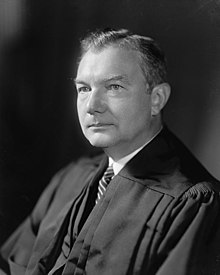
Back Robert H. Jackson Afrikaans روبرت جاكسون Arabic روبرت جاكسون (محامى) ARZ رابرت جکسن AZB Роберт Джэксан Byelorussian Robert H. Jackson Catalan Robert H. Jackson German Robert H. Jackson Esperanto Robert H. Jackson Spanish رابرت جکسن Persian
Robert H. Jackson | |
|---|---|
 | |
| Associate Justice of the Supreme Court of the United States | |
| In office July 11, 1941 – October 9, 1954 | |
| Nominated by | Franklin D. Roosevelt |
| Preceded by | Harlan F. Stone |
| Succeeded by | John Marshall Harlan II |
| 57th United States Attorney General | |
| In office January 18, 1940 – August 25, 1941 | |
| President | Franklin D. Roosevelt |
| Preceded by | Frank Murphy |
| Succeeded by | Francis Biddle |
| 24th United States Solicitor General | |
| In office March 5, 1938 – January 18, 1940 | |
| President | Franklin D. Roosevelt |
| Preceded by | Stanley Forman Reed |
| Succeeded by | Francis Biddle |
| United States Assistant Attorney General for the Antitrust Division | |
| In office January 21, 1937 – March 4, 1938 | |
| President | Franklin D. Roosevelt |
| Preceded by | John Lord O'Brian |
| Succeeded by | Thurman Arnold |
| United States Assistant Attorney General for the Tax Division | |
| In office February 26, 1936 – January 21, 1937 | |
| President | Franklin D. Roosevelt |
| Preceded by | Frank J. Wideman |
| Succeeded by | James W. Morris |
| Assistant General Counsel for the Bureau of Internal Revenue | |
| In office February 1, 1934 – February 26, 1936 | |
| President | Franklin D. Roosevelt |
| Preceded by | E. Barrett Prettyman |
| Succeeded by | Morrison Shafroth |
| Personal details | |
| Born | Robert Houghwout Jackson February 13, 1892 Spring Creek, Pennsylvania, U.S. |
| Died | October 9, 1954 (aged 62) Washington, D.C., U.S. |
| Political party | Democratic |
| Spouse |
Irene Gerhardt (m. 1916) |
| Children | 2 |
| Education | Albany Law School |
| Awards | Medal for Merit |
Robert Houghwout Jackson (February 13, 1892 – October 9, 1954) was an American lawyer, jurist, and politician who served as an associate justice of the U.S. Supreme Court from 1941 until his death in 1954. He had previously served as United States Solicitor General and United States Attorney General, and is the only person to have held all three of those offices. Jackson was also notable for his work as Chief United States Prosecutor at the Nuremberg trials of Nazi war criminals following World War II.
Jackson was the last U.S. Supreme Court justice who did not have a law degree. He was admitted to the bar via the older tradition of an internship under an established lawyer ("reading law") after studying at Albany Law School for just a year.[1] Jackson is well known for his advice that, "Any lawyer worth his salt will tell the suspect, in no uncertain terms, to make no statement to the police under any circumstances",[2] and for his aphorism describing the Supreme Court, "We are not final because we are infallible, but we are infallible only because we are final."[3]
Jackson developed a reputation as one of the best writers on the Supreme Court and one of the most committed to enforcing due process as protection from overreaching federal agencies. He was viewed as a moderate liberal,[4] and is known for his dissents in Terminiello v. City of Chicago, Zorach v. Clauson, Everson v. Board of Education, and Korematsu v. United States, as well as his majority opinion in West Virginia State Board of Education v. Barnette and his concurring opinion in Youngstown Sheet & Tube Co. v. Sawyer. Justice Antonin Scalia, who occupied the seat once held by Jackson, considered Jackson to be "the best legal stylist of the 20th century".[5]
- ^ "Solicitor General: Robert H. Jackson". Department of Justice. October 31, 2014. Retrieved September 23, 2022.
- ^ Watts v. Indiana Archived January 2, 2015, at the Wayback Machine, 338 U.S. 49, 59.
- ^ Brown v. Allen Archived August 21, 2014, at the Wayback Machine, 344 U.S. 443.
- ^ Gibson, Tobias. "Robert Jackson". The First Amendment Encyclopedia. University of Minnesota. Retrieved August 18, 2022.
- ^ Garner, Bryan A. (2018). Nino and me : my unusual friendship with Justice Antonin Scalia. New York, NY. p. 101. ISBN 978-1-5011-8149-8. OCLC 992743005.
{{cite book}}: CS1 maint: location missing publisher (link)